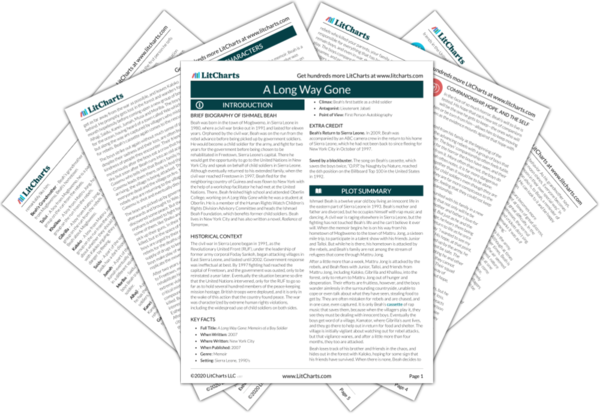Ishmael Beah is a twelve year old boy living an innocent life in the eastern part of Sierra Leone in 1993. Beah’s mother and father are divorced, but he occupies himself with rap music and dancing. A civil war is raging elsewhere in Sierra Leone, but the fighting has not touched Beah’s life and he can’t believe it ever will. When the memoir begins he is on his way from his hometown of Mogbwemo to the town of Mattru Jong, a sixteen mile trip, to participate in a talent show with his friends Junior and Talloi. But while he is there, his hometown is attacked by the rebels, and Beah’s family are not among the stream of refugees that come through Mattru Jong.
After a little more than a week, Mattru Jong is attacked by the rebels, and Beah flees with Junior, Talloi, and friends from Mattru Jong, including Kaloko, Gibrilla and Khalilou, into the forest, only to return to Mattru Jong out of hunger and desperation. Their efforts are fruitless, however, and the boys wander aimlessly in the surrounding countryside, unable to cope or even talk about what they have seen, stealing food to get by. They are often mistaken for rebels and are chased, and in one case, even captured. It is only Beah’s cassette of rap music that saves them, because when the villagers play it, they see they must be dealing with innocent boys. Eventually the boys get word of a village, Kamator, where Gibrilla’s aunt lives, and they go there to help out in return for food and shelter. The village is initially vigilant about watching out for rebel attacks, but that vigilance wanes, and after a little more than four months, they too are attacked.

Beah loses track of his brother and friends in the chaos, and hides out in the forest with Kaloko, hoping for some sign that his friends have survived. When there is none, Beah decides to get as far away from the war as possible, and leaves Kaloko behind. He promptly gets lost in the forest and wanders for a month hopelessly before coming upon a new group of boys, Alhaji, Saidu, Kanei, Jumah, Musa and Moriba. The boys head for the ocean, having heard of a town called Yele which is safe, but along the way are captured by villagers who mistake them for rebels. Beah’s cassette again comes to the rescue.
The boys strike out again without much sense of purpose, but despite their sadness and their loss, are often buoyed by the kindness of people they encounter. Their friend Saidu dies mysteriously after the boys eat a crow that has fallen from the sky, but soon after Beah runs into an old acquaintance named Gasemu who tells him that Beah’s family is in a nearby village. Gasemu leads them there, only to find that just as they are arriving, the village is being attacked. The boys rush in to find everyone dead and the village on fire. They are attacked by rebels who are returning to the village and flee, and as they do, Gasemu is shot and eventually dies of his wounds.
The boys are picked up by government soldiers soon afterwards and brought to Yele, where they think they have discovered some peace. But the village’s large population of orphans is enlisted to fight for the army, despite the fact that some of them, like Sheku and Josiah, are so small that they can’t pick up their guns. In their first battle Musa and Josiah are killed, but in the space of that battle, Beah becomes a killer. The boys are urged by their commanders to take revenge on the rebels for the deaths of their families and are given a steady supply of drugs to keep them distanced from the present. The boys make play of war, watching Rambo movies and trying to replicate the moves.
After two years as a child soldier, Beah is taken from the front to Freetown, much to his brainwashed anger. Efforts to rehabilitate him and other boy soldiers are at first met with extreme violence from the boys. UNICEF even makes the critical mistake of putting rebel boys and army boys in the same compound at first, and in the ensuing battle, several boys are killed. But by showing affection and appealing to the boys’ interests, like Beah’s love for rap music, the staff, like the nurse Esther, begin to help the boys cope with some of their trauma. After 7 months, Beah moves in his uncle, who lives in the capital city of Freetown, and even goes to New York City to speak at the United Nations on the behalf of child soldiers in Sierra Leone. There he meets Laura Simms, who leads a workshop to help the children tell their stories. She often sends him money when he is back home.
But Sierra Leone has not been rehabilitated, even if Beah has, and there is a violent overthrow of the government. Freetown becomes unsafe, as violent, in fact, as the front once was, and when Beah’s uncle dies because he cannot get a doctor, Beah decides to flee to the nearby country of Guinea and from there to the United States, having talked to Laura Simms, who has promised that she has a place for him to stay in New York.







